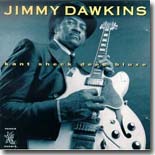|
Jimmy Dawkins
Kant Sheck Dees Bluze
Earwig Records |

When Kant Sheck Dees Bluze (Earwig Records)
was released in 1991, it was a return to form for
Jimmy Dawkins, and then some. After a great
start with Delmark Records in the ’70s, Dawkins’
later work in the ’80s (most of which was only
released in Europe) lacked the intensity of his
earlier performances for some reason. He opted to
start his own record label, Leric, and focused on
the business end of the music, bookings, promotions,
song publishing, and releasing singles by Chicago
artists like Tail Dragger and Nora Jean Wallace,
Vance Kelly, and Little Johnny Christian.
Though Dawkins was nicknamed “Fast Fingers,” that
name didn’t really fit the way he played guitar,
which is more of a slashing, stinging style. When
you hear him, he’s instantly recognizable. Though
he’s often associated with the West Side guitar
slingers like Magic Sam and Freddie King, his
relentless, muscular sound was more like West Side
on steroids. In addition, he has always been a solid
songwriter with sometimes brutally honest lyrics,
mixing in political and social concerns with songs
about his own experiences.
Kant Sheck Dees Bluze was energy and
intensity from start to finish. With Nora Jean
Wallace on vocals, Professor Eddie Lusk on organ,
Johnny B. Gayden on bass, Billy Flynn on guitar, and
Ray Scott on drums, Dawkins went to Acme Recording
Studio in Chicago and knocked this session out in
one day.
Dawkins wrote 12 of the 13 songs, including the
hard-driving opener, “I Ain’t Got It,” a shuffle in
the Elmore James tradition which kicks off the disc
in fine fashion. “Rockin D. Blues” is a slower
number, co-written with Wallace, which features more
sizzling guitar and a nice vocal turn by Dawkins.
“Made The Hard Way” has a bit of autobiography in
it, as Dawkins laments that “fame and fortune have
always evaded me,” plus a little political
commentary from the time referring to the U.S.
fighting “Sodamn Insane.”
Flynn and Dawkins had worked together regularly
since the early ’70s and Flynn was something of a
protégé to Dawkins. Each compliments the other well
on guitar. On “Gittar Rapp,” they team up for a
pretty impressive guitar battle. Flynn also
contributes mightily on the nine-minute title track,
a minor key masterpiece which also benefits from
Lusk’s keyboards. Despite worthy competition, it’s
easily the best tune on the album.
Other standout tracks include “Wes Cide Bluze,”
“Beetin Knockin Ringin” (by now, you might have
noticed that Dawkins likes to alter the spelling of
the titles on his songs), and “Luv Somebody.” “Gotta
Hold On” is a gospel-flavored number that provides a
nice change of pace to the non-stop intensity of the
earlier tracks. Wallace sings lead on two tracks, “A
Love Like That” and “My Man Loves Me.” To be honest,
Ms. Wallace is a good singer, but she’s just not my
cup of tea. However, the musicians do a fine job on
these tracks, notably Lusk and Gayden.
Kant Sheck Dees Bluze marked a return to form
for Jimmy Dawkins. He returned a couple of years
later to record several discs with the Wild Dog
subsidiary of Ichiban Records in the mid ’90s, then
a pair for Fedora Records in the early 2000s. Though
the guitar playing continued to be amazing, the
later recordings featured fewer original
compositions from Dawkins. Kant Sheck Dees Bluze
ranks as one of his best recordings (just below his
Delmark debut, Fast Fingers), and is
certainly his most personal recording.
--- Graham Clarke